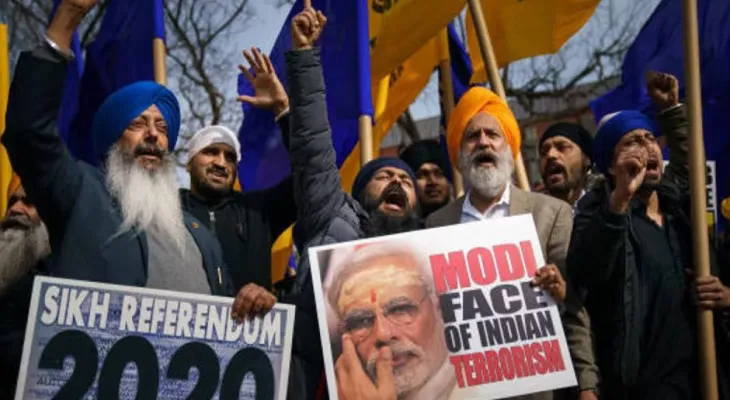Search here
Newspaper
Search here

Arab Canada News
News

Published: September 28, 2022
The Indian government has issued its sharpest statement to date regarding what it calls "anti-India activities" coming from Canada. The statement expressed India's concern and disappointment over what appears to be Ottawa's refusal to take concrete action on this matter.
This statement came following the participation of thousands of Canadian Sikhs in an unofficial voting process earlier this week, called the "Khalistan referendum" to express their support for the establishment of an independent Sikh nation-state separated from New Delhi in northern India.
While Canadian authorities defended this activity as merely an exercise of freedom of expression, the Indian Ministry of Foreign Affairs accused Canada of allowing extremists to carry out "politically motivated operations" which are "categorically rejected" due to the threat they pose to India’s integrity.
In a warning issued on Friday to its citizens and students present in Canada, India alerted them to the need to "exercise caution and remain vigilant" amid a "sharp rise" in hate crimes and sectarian violence there.
Considering that immigrants from India constitute at least 1.4 percent of Canada’s population, among them a large number of Sikhs, the "Khalistan" campaign is increasingly becoming a sensitive issue in relations between New Delhi and Ottawa.
What is the "Khalistan" referendum?
This unofficial "referendum" is a voting process organized in several countries by the "Sikhs for Justice" organization, which is headquartered in the United States and has been banned in India since 2019 due to its adoption of separatist and extremist activities.
The referendum aims to confirm consensus among Sikh communities on establishing a separate homeland within India, which will be known as "Khalistan".
The general proposal [by those running this referendum] to achieve this goal is to carve out the Indian state of Punjab, the only state in the country where Sikhs form the majority of the population.
The campaigning group states that it will communicate with the United Nations and other international human rights bodies to demand the reestablishment of "Punjab as a nation-state".
The head of the "Sikhs for Justice" organization, founded in 2007, is Gurpatwant Singh Pannun, a law graduate from Punjab University and currently practicing as a lawyer in the United States.
The group initially announced in 2018 that it would conduct an unofficial voting process, then called "Referendum 2020", in several countries where large Sikh diasporas reside, aiming to "liberate Punjab from Indian occupation".
According to the organization's website, "The Sikhs for Justice organization announced in London [in August 2018] that it would conduct the first ever non-binding referendum within the global Sikh community on the issue of separation from India and reestablishing Punjab as an independent state".
The organization said it planned to hold the referendum in Punjab along with major cities in North America, Europe, Australia, New Zealand, Malaysia, the Philippines, Singapore, Kenya, and the Middle East.
Indian authorities in Punjab claimed that Pakistan promotes and funds the "Sikhs for Justice" organization and the "Referendum 2020" campaign as tools to destabilize India.
Indian intelligence agencies cited information that "Sikhs for Justice" shares its domain with a website based in Pakistan, which is evidence of their suspicious relationship.
There are about dozens of cases registered against "Sikhs for Justice" and its leader Pannun in India, including three in Punjab.
What happened in Canada?
About 100,000 people are said to have participated on September 19 in the Khalistan referendum in the Canadian city of Brampton to vote in favor of demanding the establishment of an independent Sikh homeland in India.
Images and videos posted on social media showed some Sikhs holding yellow flags inscribed with the word "Khalistan", lining up in long rows to cast their votes.
A Hindu temple in Etobicoke in Toronto was vandalized earlier this week, with the phrase "Long live Khalistan" written in orange on one of its walls.
A similar referendum was conducted in London during November 2021, with activists claiming that between 10,000 and 12,000 people participated, though other reports indicate that only about 100 to 150 people had attended in the early hours of the referendum.
What did the Indian government say?
India says it is actively engaging with Canada and other governments on the "Khalistan" issue.
Arindam Bagchi, the government spokesperson, said in his weekly media briefing last Thursday, "The farcical process was carried out by extremists and radical elements supporting the so-called ‘Khalistan referendum’ in Canada and elsewhere, as I understand." He added, "The matter has been raised with Canadian authorities through diplomatic channels."
The spokesperson noted that the Canadian government reiterated that it respects India's sovereignty and territorial integrity and that it will not recognize the so-called referendum.
He continued, "However, we find it highly unacceptable to allow extremist elements to conduct politically motivated activities in a friendly country. You are all aware of the history of violence in this regard."
Bagchi, who issued a warning to Indian citizens on Friday, explained that [Indian authorities] raised the issue with Canadian authorities to call for an investigation into hate crimes. He added, "The perpetrators of these crimes have not yet been brought to justice."
The Indian Ministry of Foreign Affairs has urged Indian citizens and students in Canada to register with the High Commission of India through an electronic portal to allow communication with them during emergencies.
Comments